- Home
- Stephen Hunter
I Ripper Page 7
I Ripper Read online
Page 7
An ugly current has been loosened, egged on by reprehensible newspapering, as led by the noxious Mr. Harry Dam of the Star. He was, for a time, obsessed with some apparition called Leather Apron, a mystical Jew butcher-beast, and as a consequence, Whitechapel became unsafe for the many poor Jews who live there. About that reality, neither Dam nor the Star appears to care a jot! In any event, Leather Apron was soon rounded up and found completely innocent, as were several other Jews and marginal wretches who bumbled into Warren’s crude dragnet. But even as these cases are revealed to be without foundation, nobody is listening and the temperature is rising. Soon lynchings may occur, followed by pogroms, neighborhood burnings, the death of innocents. It will be a return to the Middle Ages.
It is the most perfect screen for my next and most ingenious move. My mind is clever, and if I plot carefully, reconnoiter adroitly, and am bold, I will triumph in the end. This stroke of genius has an added advantage: I have enough blood on my hands and will happily greet Old Scratch when he leads me to hell’s tenth circle, but I do not need to add that of a thousand Jewish babies. I will be cleansed of that sin. Egad, have I accidentally done something moral? How appalling!
CHAPTER TEN
Jeb’s Memoir
I opened the envelope—finding it first of all to be on the heavy cream stock of higher taste, familiar somehow—removed the missive inside, unfolded it, half recognized the penmanship, and then fully recognized it fully: Charlie!
That is, Charles Harrison Hilliard, editor of Contemporary Review, a lively and often bawdy arts journal that I contributed to quite regularly for some years before falling into the Star’s orbit, therefore aligning myself with Big Boring Press and cutting loose from Small Impudent Press. Charlie came from department store people in some far provincial town, but he, having none of it, was quite content to spend their hard-earned money on a quarterly of sublime physical beauty that was notably full of irreverence, immaturity passing as wit, radical politics, the need to shock for its own sake, and the occasional truly well-conceived essay by someone whose name was not yet big enough to get him published in the Atheneum. That was me. The Atheneum crowd, very Oxbridgy and, for all their liberal airs, quite nose-up when it came to rube Irish geniuses in brown suits with the look of a pig farmer’s right-hand man, had yet to notice me and perhaps never would. Very well, I snorted to myself many a time, I shall live quite happily without the Atheneum, and I paid them back the insult of not noticing me by not noticing them, which they never noticed.
So here was Charlie, after a few years’ absence from my life.
It’s been too long. We had so many good laughs but now you’ve disappeared, even from O’Connor’s horrid Star. You were the best critic in London, which meant you had to be punished for your temerity in so regularly humiliating the bigger fishes. Hope you’re writing a novel or a play or something. Can’t wait to hear.
In any event, do please come to a soiree I am holding tomorrow night at eight, full of interesting chaps, all of whom hate Atheneum, having not been noticed yet by them, either. Rather a chatty lot, you’ll fit right in. Gals, too, artist and poet types, perhaps shady in certain aspects if you wish that game upon yourself. Teetote if you want, but the punch will be spiked with rum and the fizzy in the bottle will knock a jack-tar on his arse!
Best,
Charlie
It arrived at the perfect time. I’d worked myself to exhaustion on the murders, much to O’Connor’s satisfaction, but even he could see I was running ragged. He instructed me to take some days off, which I spent mostly sleeping, to avoid my mother. Now, just as I was feeling revived, Charlie’s invite arrived and it seemed a perfect anodyne to dead whores in alleys and yards.
I had a bang-up time. I didn’t dominate, no, but neither did I withdraw into recessiveness, and I came up with as many clever lines and swift retorts as any of them. It was a fast crowd, they drank and smoked too much, they fancied themselves “outlaws” (but of the safest sort), and the alcohol liberated them to pretend to be who they wished to be. As for me, I pretended to be a more widely published writer, or a writer rather than a subspecies called “journalist” or “critic.” I wore the brown wool suit, having no choice in the matter, with a blue cotton shirt, and looked like a cross between a barroom poet and an IRA gunman, as I had wanted. Some may have thought me dangerous, which I rather liked, not knowing that lump in my pocket was an extra handkerchief instead of a Webley, and I enjoyed the mystery I seemed to carry about, the sense of knowing more than I did. As a veteran observer of life and death, I thought myself superior to all of them, for their bohemianism, social nonchalance, and contempt for convention was mostly affectation. I’d seen gutted lasses and knew in fact, not merely in theory, how short, nasty, and brutish life could be.
I’m not sure when I noticed him. It was subtle. He was just there. No, I am not about to confess some homosexualist secret, like the one that doomed poor Wilde to Reading Gaol a few years later, and I have no pressing desire to touch the flesh of a being of the same sex. But I am wooable by wit, dynamism, worldliness, good taste, and as I pretended to myself, the certain knowingness that bespeaks a fellow who has seen and tasted much.
“You’re the music critic, no?” he asked me when the drifting of people and the vagaries of alcoholic imbibing brought us together on the flow of the currents. He was tall, and his tweed, I noted, was of fine quality. The tailoring was superb, a three-piece suit of very modern cut, with red four-in-hand instead of a black fluffy bow tie, and the whole effect was of a fellow who paid close attention to his clothes until he put them on.
“I was for a time,” I said.
“Hope you closed down all the concert halls,” he said. “Such puerile jibber-jabber. When are they going to have the guts to change one single thing about the classical canon? It’s mostly Wagner done poorly, since we treacle-slopping Brits don’t have the coldness of soul to do Wagner as he should be done, all savage and scary. We do him like Dion Boucicault doing Dumas with kettledrums and trombones. Not a damned thing for anybody with a brain, or at least the aspirations to thought. Music as social instrument is an alien concept to them.”
“I must say,” I said, “you speak like a critic yourself, sir. That’s a thought I’ve had many a time. Meanwhile, in Europe there’s some interesting work. The Russian Anton Rubinstein is using the baton to do something other than slop treacle for the pigs.”
“ ‘Treacle for the pigs,’ ” he said. “I like that. My name’s Dare.”
I told him mine.
“Of course,” he said. “I pretended I didn’t know you, but I’ve read your pieces in Charlie’s little rag. You were a boy worth watching, I thought. I watched, I watched, I watched. Where on earth did you go?”
“I wrote music under a nom de guerre for a year for the Star and then had an opportunity to try my hand at another part of the journo game. It’s been interesting, though without much glory.”
“Well, you had the divine spark. Don’t lose it in some larger outfit that wants to regulate all voices to the same modulation. But I have tenure, so I’m great with career advice, not having to worry about such things as food, board, and money.”
“You teach?”
“I yell at them. They pretend to listen. I grade the papers by throwing them down the steps and determining which land on the ninety step, which the eighty step, which the seventy. No one seems to care much, and I can never get in trouble with the department, since I’m also the department head. The corruption is blissfully total.”
I found this line very amusing, almost irresistible. I love it when those safely in the bosom of a comforting institution trash it savagely, pointing out its follies, brutal politics, bad behaviors, and utter tomfoolery, but with such good cheer and equanimity as to suggest that all they say will be so relentlessly honest.
“You have a dramatic way about you, sir,” I said. “I’m sure you entrance the students.”
“I’d like to entrance some of the girl
s into bed, I would. The beastly boys, I’d entrance them off to Afghanistan or the Crimea—say, are we still in the Crimea?”
“I believe we’ve moved onward in our Christian crusade.”
“Well, wherever there are too many wogs, the darker the better, all fuzzy and wuzzy at once. Every good English boy should spend a few years Gatling-gunning nig-nogs for queen, country, and the interests of the Birmingham steel lords. And to keep the price of silk for Charlie’s pater’s department stores down.”
Speaking of Charlie, he suddenly bore down upon us, holding a champagne bottle in each hand. He’d been pouring his way through his guests.
“I see you two have found each other,” he said. “I knew you would, as you’ve much the same temperament and scabrous insight. Tom does phonetics at the University of London.”
Good God, I thought. The Professor Thomas Dare!
“I was telling our young friend here the sad truth of academics today,” said Professor Dare. He had round black spectacles, wavy blond hair, and one of those aquiline profiles that seemed to make him the grandson of the Iron Duke. But his irony had no Wellington in it. “At least my lackadaisical approach to duty leaves me with enough time for my experiments, which are the real thrust of my life. I can tell you, if you want, why a tribe in Africa called the Xhosa speaks with a peculiar popping sound, like a short, dry belch; they literally communicate by burps.”
I laughed. Amusing fellow.
“And then there are the Germans. Do you know, they form words by just sticking them together, so that their word for ‘Gatling gun’ literally translates into ‘mechanicaldeviceshootingwithoutcockingrifle?’ The words get longer still. No word is too long for a German because it’s quite impossible to bore a German. You cannot entertain a Norwegian, you cannot bore a German, and you cannot educate an American or a chimpanzee.”
I laughed again, then sought to turn him on another course. “What experiments have you done?”
“Too many by half,” he said.
I had read of him and thought I knew the background. Renegade intellectual, too bold for Oxford or Cambridge, too radical for any provincial place, always going off exploring, had theories of language as it related to society, and had invented—yes, that was it—a universal alphabet.
He wanted to do away with tribalism, nationalism, paternalism, capitalism, communism, militarism, vegetarianism, colonialism, ismism, anything that could take -ism as a tail end. Any thought, belief system, article of faith, uniqueness of dress, or size of boot heel. His methodology consisted of converting the world to one language that all would speak without accent, or indication of geography, class, or origin. Each man, each woman, each child would be a tabula rosa, so to speak, and come at the world without prejudice or hostility applied before he even got a chance to show what he or she could do.
Naturally, Dare was laughed off the front pages and hadn’t been heard from in some time. For one thing: Who would pay for it? For another: Who would teach it? For still another: Who would enforce it?
“I do remember your piece in the Times, Professor Dare,” I said. “A nice stir it caused, as I remember.”
“Dare’s Dare. What piffle. All gone, best forgotten. I was a fool, believed in the educability of the species and that humanity was capable of acting on its own behalf. But people are born with such deep ideas and grow so attached to them that it’s like trying to argue them out of a limb. If I said to you, ‘Say, your life would be better without that damned leg,’ what would you say?”
“Why, you’re a madman.”
“Indeed, and that is what they said to me. Anyhow, enough of this chitchat about my squalid past. I will leave you and mingle. I think there’s someone here who could help my reputation whom I haven’t yet insulted tonight. Possibly it will come to fisticuffs, which would be the ideal outcome.”
And he was swept away.
“Interesting fellow,” I said to Charlie.
“Tom’s a charmer. Brilliant but won’t back down. Perhaps a ruinous fault. You could call it a personality flaw, but you could also call it a heroic attribute. Socrates had it, too. So he gets destroyed and the mediocre continue to clump along to domination, producing universal stultification. Perhaps in a hundred years he will get his due. Champagne, my friend?”
I turned Charlie down, and he drifted away to fill more glasses. The party waxed and waned like a moon, and it seemed little eddies of energy were forever breaking out wherever I wasn’t, and when I turned to the laughter, I always saw Professor Dare at the center of it, and yet when they seemed to have him pinned down for serious conversation, he’d somehow peel off and take his magic elsewhere.
* * *
At last the party seemed to be breaking up, and by my pocket watch, I knew it was time to say thanks to Charlie and depart from this leafy street in Bloomsbury. I assumed finding a hansom wouldn’t be much of a problem. But a crowd had backed up around Charlie at the doorway, so I backed off and, seeking relief from the closeness of the room, stepped out on the terrace. Ah, the sweetness of the clean air, the drift of some sweet flower’s perfume, the clear night above. I drew it all in, enjoying, and then who should I find hunched against the balustrade but Professor Dare, enjoying a cheroot.
“Oh, hullo,” I said. “I enjoyed your company. You see the world much as I do myself.”
“I hope not. I detest it and everything in it. I once believed in everything, now I believe in nothing. You’re much too young for such cynicism. You have bruising and scarring left to do. You must earn the purity of your contempt, else it’s a pose meant to attract attention.”
“Well, you hide your disillusion brilliantly by the boldness of your wit.”
“Could always crack a line, I’ll say that for myself. But we do have something in common, I might add, now that I think of it.”
“And that would be?”
“Why, Jeb, we both detest Sir Charles Warren and understand that he is entirely too stupid in his thinking to catch this fellow you chaps call the Whitechapel Murderer.”
It was quite a moment. Not a word had been said about the murders the whole night, and I had presumed no one there had any idea I wrote under Jeb for the Star and had seen the wrecked and bleeding bodies steaming and leaking in the cool night air.
“I say,” I said, which is what people say when they have nothing to say, “I say, you have the advantage over me. I know not—”
“Oh, come now. I’ve particularly enjoyed the pieces on Warren’s folly. Your analysis of the broken system that underlies his Scotland Yard is spot-on, but even if they become more efficient and get more boots to the street faster, I don’t think the killer will fall to dragnet. If he were that careless, his luck would have run out, given his need to commit his deeds in heavily patrolled areas, just missing the blue bottles by a hair each time out.”
“Professor Dare, I shan’t lie, because I am indeed professionally Jeb, but how on earth, sir, did you know? Did some kind of spy—”
“No, no. Language. Phonetics. One of my many theories is that we speak two Englishes, a shallow English and a deep English. The second is the language of structure, organization; I call it the Beneath. It lurks, prehistoric and brutal, under the gibbets of grammar, words, punctuation, and neatness in penmanship. It is a reflection of the manner in which we solve problems, it expresses how we think, it expresses our true self. It is, in the end, our truth. I believe I’ve trained myself to read for the tracks of this Beneath, and when I read Jeb in the Star over the past few weeks, I saw those tracks. The music was extremely familiar. Some of the words, too, some of the effects—though now you’re drawn through the sieve of newspaper editing, with some dilution occurring. But I recognized it. You have much to write, much to learn, but if you give it your life, you might at one time accomplish something of note.”
“I’ve actually written five novels. Unpublished, the lot.”
“Write five more.”
“Perhaps I shall. But may I ask, to return to
first causes, why you despise Warren at my level of intensity? It seems to be my job, and that explains my occasional interceptions of his vector, but you, sir, a professor at university, I cannot—”
“The murderer. The fiend, of course.”
“The murderer?”
“I adore him. He is so real, he is so fascinating, I cannot get enough. And unlike anything in years, he provokes me. That is why I pore over the accounts; that is why, when time has cooled off the curious mobs, I visit each murder site and look hither and yon for whatever the coppers may have missed. Haven’t found a thing yet. And the most demanding question of all: Where is he? Do you have theories?”
“I don’t believe, no matter what the Star publishes, that he’s a Jew. What little I know of Jews convinces me they are not of killing ilk. No, he’s one of us, and his contempt for the poor degraded Judys is really a critique on our system. But perhaps I impose my politics. Sir, do you have theories?”
“In formation. Unsuited for expression at this time.”
“I would love to hear them.”
“Perhaps, then, when they jell into aspic, I shall invite you to the club for a chat. Does that suit?”
“Fabulously,” I said.
CHAPTER ELEVEN
The Diary
September 25, 1888
* * *
I had planned very carefully this time, and reconnoitered skillfully, examining against the triple indices of privacy, escape possibilities, and constable patrols. I had found a perfect spot, for this one had to be perfect, and for it to be perfect I had to have privacy with the body for more than a few minutes. I had this night an important agenda. Too bad a poor missy would have to pay for my higher purpose, but then that is the way of our wicked world, is it not?
This time I marked the area south of Whitechapel Road as my hunting ground, while my two previous expeditions had been well north of it. Where Commercial crossed it, then bent toward the east—Whitechapel’s layout is a mess, by the way, having been invented a thousand years ago by wandering cows, chiefly—it pursued an admirable straight course for quite a ways, and the fourth intersection it afforded was with the nondescript Berner Street. This byway yielded a low no-man’s-land of grimy brick and chimney, and being close to Commercial, where the Judys still were ample, it offered darkness for many a secluded rut. I reasoned it would be easy enough to engineer a tête-à-tête with one, and she would turn off Commercial and lead me down Berner. That such a spot was but a few blocks from the police station did not particularly perturb me, for in my observation, the constables did not favor Berner with their attentions.

 Point of Impact
Point of Impact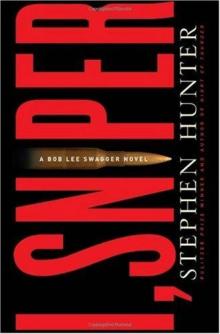 I, Sniper
I, Sniper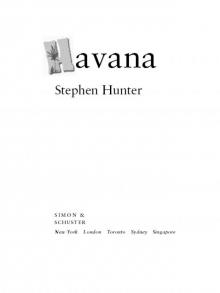 Havana
Havana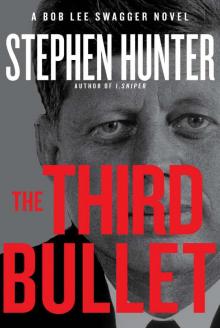 The Third Bullet
The Third Bullet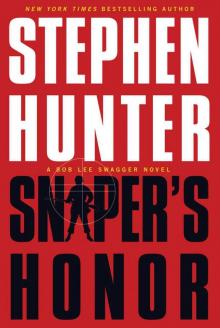 Sniper's Honor: A Bob Lee Swagger Novel
Sniper's Honor: A Bob Lee Swagger Novel Dirty White Boys
Dirty White Boys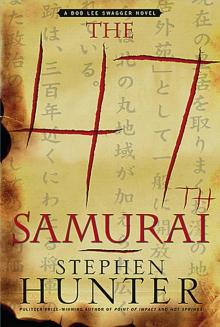 The 47th Samurai
The 47th Samurai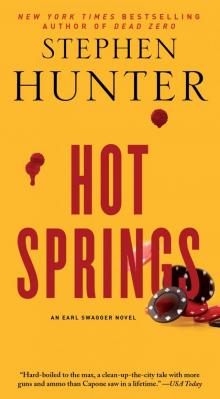 Hot Springs
Hot Springs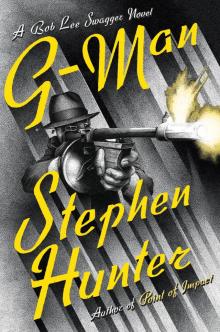 G-Man
G-Man Black Light
Black Light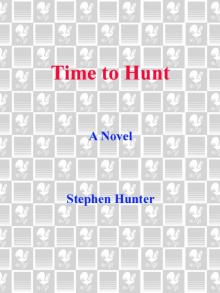 Time to Hunt
Time to Hunt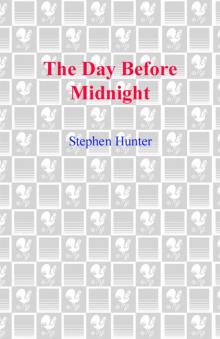 The Day Before Midnight
The Day Before Midnight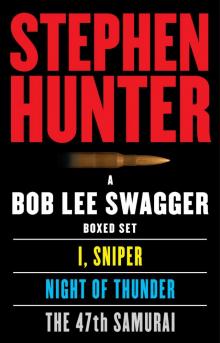 A Bob Lee Swagger Boxed Set
A Bob Lee Swagger Boxed Set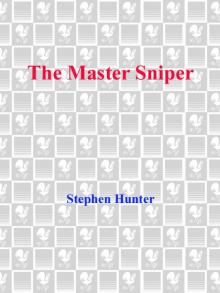 The Master Sniper
The Master Sniper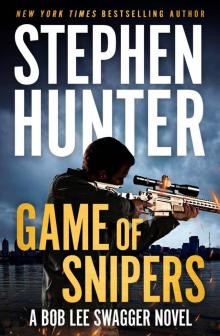 Game of Snipers
Game of Snipers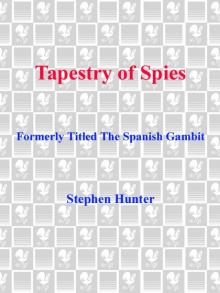 Tapestry of Spies
Tapestry of Spies Citadel
Citadel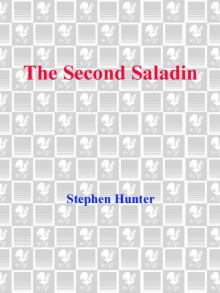 The Second Saladin
The Second Saladin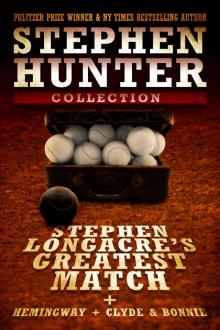 Stephen Longacre's Greatest Match
Stephen Longacre's Greatest Match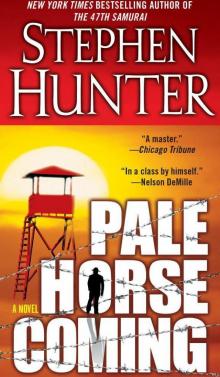 Pale Horse Coming
Pale Horse Coming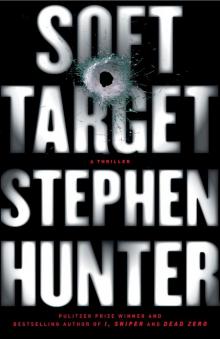 Soft Target
Soft Target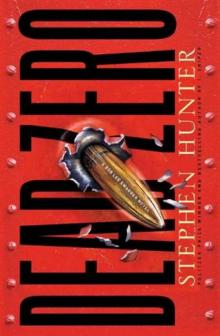 Dead Zero
Dead Zero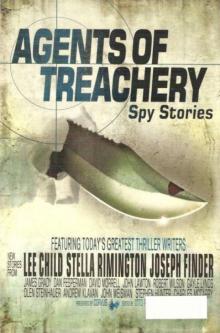 Casey at the Bat
Casey at the Bat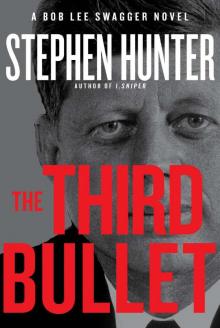 The Third Bullet bls-8
The Third Bullet bls-8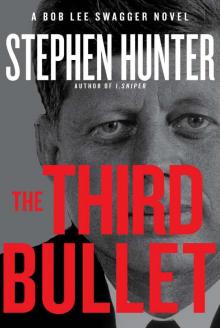 The Third Bullet: A Bob Lee Swagger Novel
The Third Bullet: A Bob Lee Swagger Novel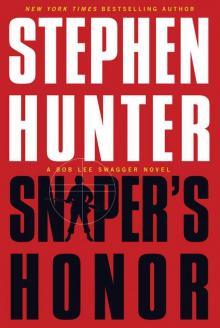 Sniper's Honor
Sniper's Honor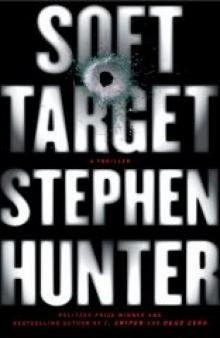 Soft target rc-1
Soft target rc-1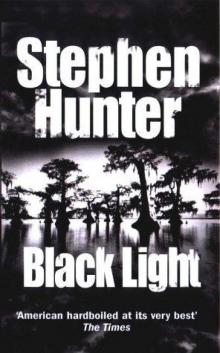 Black Light bls-2
Black Light bls-2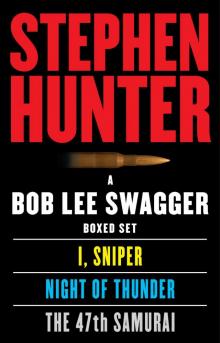 A Bob Lee Swagger eBook Boxed Set: I, Sniper, Night of Thunder, 47th Samurai
A Bob Lee Swagger eBook Boxed Set: I, Sniper, Night of Thunder, 47th Samurai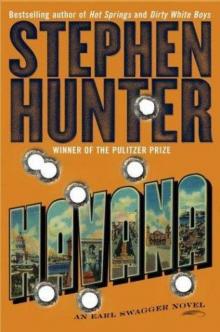 Havana es-3
Havana es-3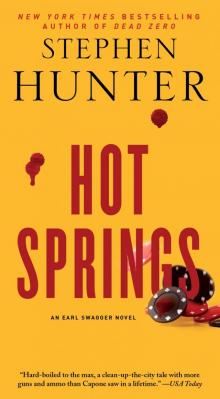 Hot Springs (Earl Swagger)
Hot Springs (Earl Swagger)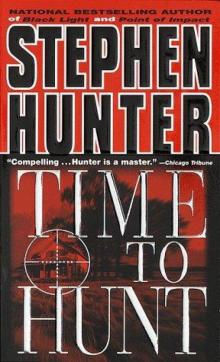 Time to Hunt bls-1
Time to Hunt bls-1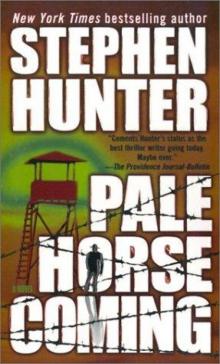 Pale Horse Coming es-2
Pale Horse Coming es-2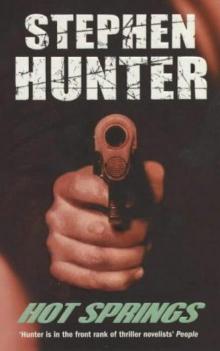 Hot Springs es-1
Hot Springs es-1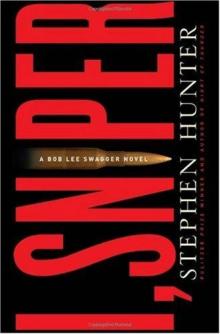 I, Sniper: A Bob Lee Swagger Novel
I, Sniper: A Bob Lee Swagger Novel